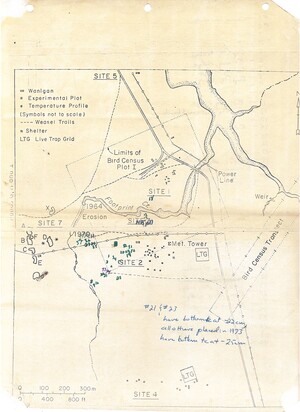Researchers at the Ecosystems Center have engaged in long-term research on ecosystems ranging from the coast of Massachusetts to the Alaskan tundra. Over the past few decades, ecologists have found that long-term ecological studies are valuable to understanding and predicting ecosystem behavior. Because some ecological changes occur slowly and at non-linear rates, long-term observations and long-term experiments are valuable methods to study how systems change over time and respond to internal and external changes. The Ecosystems Center has been affiliated with three Long Term Ecological Research (LTER) projects from their start: the Arctic LTER (established in 1987), the Harvard Forest LTER (established in 1989), and the Plum Island Ecosystem LTER (established in 1998).
Before the Ecosystems Center was founded in 1975, some ecologists who would later become researchers at the Ecosystems Center participated in two experiments that attracted special attention in long-term ecological research: the International Biological Program (IBP) and the Hubbard Brook ecosystem study. The IBP was an international consortium of scientists who aimed to bring biology and ecology to a global scale. From 1970 to 1975, researchers made observations and conducted experiments in different biomes, or ecological zones, around the world. These studies focused especially on carbon, nitrogen, and phosphorus cycling in ecosystems. Scholars have noted that the IBP funding and programs trained a generation of ecosystem ecologists. Ecosystems Center researchers John Hobbie and Gus Shaver both participated in the IBP’s Tundra Biome research program in Alaska.
The Hubbard Brook ecosystem study, on the other hand, was a much smaller site than the IBP. The ecologists Gene E. Likens and F. Herbert Bormann at Dartmouth College started this experiment in 1963. Likens and Bormann attracted a set of researchers to study differences between and changes in the seven watersheds contained at the Hubbard Brook. This study was seen as an ideal example of ecosystems ecology in the 1970s. Ecosystems Center researchers Jerry Melillo and Bruce Peterson were both involved in the Hubbard Brook study area for a period of time.
In 1980, the US National Science Foundation (NSF) created the Long Term Ecological Research program to specifically support long-term ecological studies. The NSF holds sporadic proposal competitions for new LTERs. Every six years, researchers leading already-funded LTERs must reapply for funding. The NSF LTER program aimed to support the study of biological growth and processes at multiple scales and locations, as well as the movements of nutrients through ecosystems. Although there is a high degree of variation in the locations, methods, and overall research programs of each LTER research site, together they constitute a research network that has provided incredible insights into our understanding of how ecosystems change.
A consistent finding of the three Ecosystems Center-affiliated LTER programs was that short-term study results were often not useful for making long-term predictions of the future behavior of ecosystems. Feedback between different ecological processes, climate variability, and organismal adaptation all contributed to the difficulty in making long-term predictions based on short-term studies. Researchers learned that instead of extrapolating short-term results, better predictions could be made using process-based mathematical models. Process-based models incorporate ecological principles, such as the flow of energy in a system, to predict behavior of a system over time. Researchers have used data from the LTER sites to develop, calibrate, and validate mathematical models of ecosystem processes. These models can then help make longer-term predictions, or to test experiments that would be difficult to conduct in the field.
Stable Isotope Research
- Peterson et al. 1985
- Peterson and Frye, 1987
- http://www.uwyo.edu/sif/stable-isotopes/index.html
Computers and the Internet
- LTER Report: Internet and LTERs 1990
- LTER Report: Tech development LTERs 1991
- NSF Report http://www.nsfnet-legacy.org/about.php
Microbiology and Molecular Biology
- Hobbie et al. 1977
Historical Contet of Climate Change Research
- Canadell et al. 1999
Global Carbon Cycle Project
- Houton et al. 1983
- Moore et al. 1981
- Rastetter and Shaver 1992
Processed-based Models TEM and GEM
- Melillo et al. 1993
- Raich et al. 1991
- Rastetter et al. 1991
Long-term Ecological Research at the EC Historical Context
- Hagan 1992, An Entangled Bank
- Hobbie et al., 2006
Arctic Long Term Ecological Research: Toolik Lake, Alaska
- Chris Neill. https://www.youtube.com/watch?feature=player_embed...
- Hobbie and Kling, Eds, 2014, Alaska's Changing Arctic: Ecological Consequences for Tundra, Streams, and Lakes
- 1987 LTER NSF proposal
- 1998 LTER NSF proposal
- 2010 LTER NSF prososal
- http://arc-lter.ecosystems.mbl.edu/
Forest Long Term Ecological Research: Harvard Forest, Massachusetts
- http://science.energy.gov/ber/highlights/2013/ber-...
- Frey et al. 2013
- LTER 1 grant, 1988 http://harvardforest.fas.harvard.edu/sites/harvard...
- Melillo et al. 2002
Coastal Long Term Ecological Research: Plum Island Sound, Massachusetts
- Hayden et al. 1996 http://atlantic.evsc.virginia.edu/~bph/LTER_LMER/w...
- NSF LTER proposal 1998
- NSF LTER proposal 2002
- Valiela, 1995. Marine Ecological Processes.
- VIMS, Nutrient cycling: http://web.vims.edu/bio/shallowwater/ecosystem_pro...
Ocean Flux Program
- MBL. ND. "Ocean Flux Program." Ecosystems Center a the MBL. http://www.mbl.edu/ecosystems/conte/ofp/
- Chapin III, Stuart F., Pamela A. Matson, Peter M. Vitousek. 2012. Principles of Terrestrial Ecosystem Ecology. Springer: New York.
- Conte, Maureen. 2014. "Particle Flux in the Deep Sargasso Sea The 35-Year Oceanic Flux Program Time Series." The Official Magazine of the Oceanography Society Oceanorgraphy. 27(1). http://tos.org/oceanography/assets/docs/27-1_conte...
Semester in Environmental Science Program
- The Ecosystems Center Report 2015-2016
- MBL. ND. "Student Projects." Ecosystems Center a the MBL. http://www.mbl.edu/ses/courses/projects/
- MBL. ND. "Semester in Enviromental Science." Ecosystems Center a the MBL. http://www.mbl.edu/ses/

